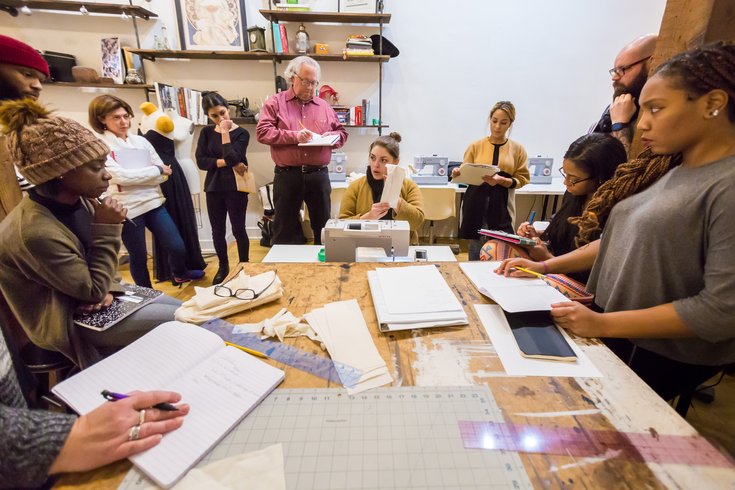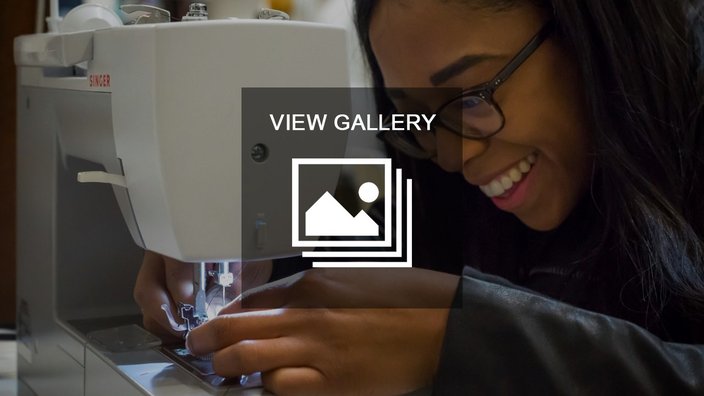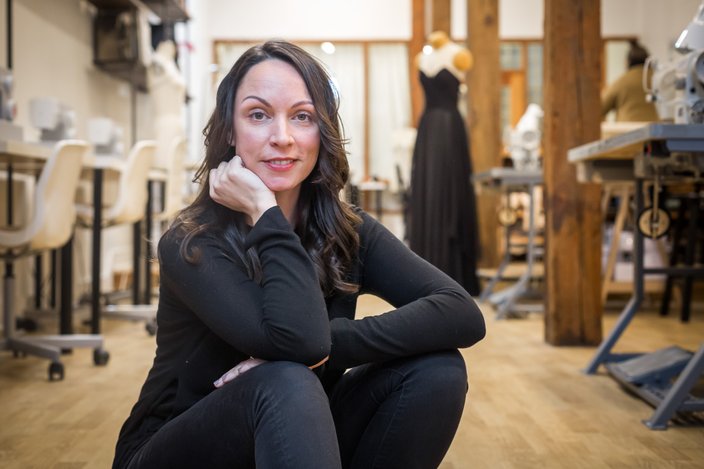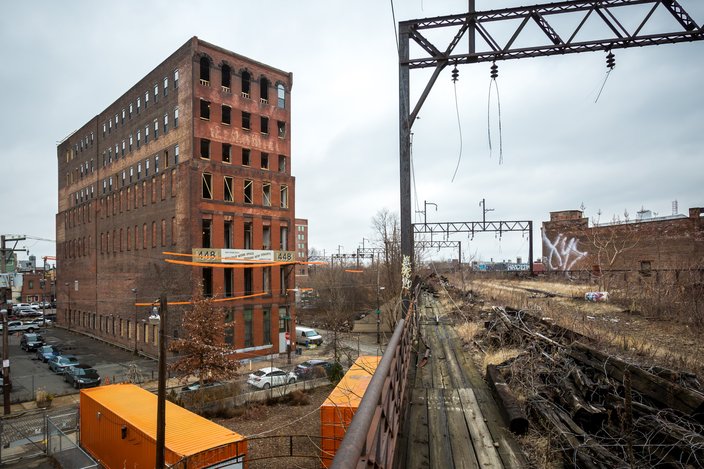
January 23, 2017
 Thom Carroll/PhillyVoice
Thom Carroll/PhillyVoice
Zoey Hudson, center, assistant director and instructor at Made Institute in Old City, gives a demonstration during a recent Introduction to Sewing class. The school will move to the Spring Arts District in August.
Class is in session at Rachel Ford’s Made Institute in Old City.
The first cohort of aspiring designers in the 15-course Designer Development Program is sketching, draping and sewing, and this summer they will have new, bigger digs in the Spring Arts District as one of the centerpiece businesses in a new maker community masterminded by developer Craig Grossman.
Grossman, who worked for the late visionary developer Tony Goldman (SoHo, South Beach), is best known for revamping South 13th Street into the current Midtown Village and sees this section of town as a center for the creative class where art, culture and technology will co-exist. His father worked in the New York garment industry and when he met Ford last summer, they clicked. Jennifer Supplee threads the needle of a sewing machine before stitching together strips of cut muslin during a class at the Made Institute. More than 50 application requests already have been received for the spring session.
Ford, a designer and educator, has a vision, too: a new fashion ecosystem in a city that was once a hub for clothing and textile design and manufacturing.
In August, she will move Made Institute into a 3,400-square-foot space at 448 N. 10th St. The 7-story, 50,000-square-foot building formerly housed the Haverford Cycle Company, one of the last industrial buildings in the area. The Spring Arts District spans from 8th to 12th streets, from Noble to Spring Garden streets.
Grossman's Arts and Crafts Holdings has also signed leases with two tech firms, Azavea and Boco Digital, and the Roy-Pitz brew pub.
“This pocket seemed like an overlooked area with a great history where some of the original makers of Philadelphia worked," he said.
Before launching Made Institute, founder and owner Rachel Ford designed for Urban Outfitters and was a cutter/draper for the Philadelphia Opera. “This is a new approach to fashion and design schooling,“ she says. ”We want to help designers launch small fashion companies of their own.“
Made’s space will not only hold classes for aspiring fashion designers but also feature a membership-based “Fashion Co-Working Space,” fully equipped with industrial machinery, cutting tables, dress forms and resources for the growing fashion community in the city. This past August, Ford received a license from the Pennsylvania Department of Education for the program. She has already received more than 50 application requests for the spring session.
She and her staff will train students to become professional sewers, tailors, fashion designers and design entrepreneurs.
“This is a new approach to fashion and design schooling. We want to help designers launch small fashion companies of their own," Ford explained. "We focus our curriculum on the entrepreneurial experience, while still presenting the fashion landscape as a whole. A focus on sustainability, resourcefulness, and embracing the latest technical methods are what really set us apart from other school experiences.”
Before launching Made, Ford designed for Urban Outfitters and was a cutter/draper for the Philadelphia Opera. Her instructors have master’s degrees or work as fashion designers, she said. Her students come to her with other degree backgrounds, looking to switch careers or save money getting training. The Designer Development Diploma in Fashion Design, which focuses on teaching start-up designers what they need to know to enter the marketplace, can be completed in one year. The full cost of the diploma is $7,845.
“When I was introduced to Rachel and visited Made Studio, I saw the Wolf forms and the machines and it brought me back to visiting my dad in Midtown Manhattan.” – Craig Grossman, Spring Arts District developer
The second prong to the Institute is the launch of their Fashion CoWorking Space, which allows members to use their state-of-the-art machinery, tables and start-up know-how to produce small collections. It will be open late night and offer three levels of membership (4 visits monthly, $75; 12 visits monthly, $150; 25 visits monthly, $300) as well as locker storage, access to machinery and 10 percent off classes. Ford received a $10,000 grant from The Merchants Fund to purchase 12 new industrial sewing machines for the making of both knit and woven garments.
“Designers that need a home base can avoid the costs of equipment capital and space, and use our studio whenever they need to,” Ford said. “In order to bring some manufacturing back to Philadelphia, there needs to be an investment made by private businesses like us into the design community at large. Our fashion co-working space is created to be a hub, open to the public at a low cost to promote and facilitate Philadelphia design businesses.
"I hope that the space serves to inspire other aspects of the industry, like textile factories, fashion tech resources, and manufacturers will start to pop up and grow to inspire Philly's designers to stay in Philadelphia and imagine their design goals," she continued. "Textiles, fashion tech and manufacturing have so much room to grow here in Philadelphia.”
In August, Made Institute is scheduled to move into the former location of the Haverford Cycle Company, in a section of the 50,000-square-foot building at 448 N. 10th Street near the elevated Reading Viaduct.
It was just four years ago Ford opened her doors in Old City teaching skills to the start-up designer, dressmaker, or home sewer with hands on instruction. She expanded to courses in patternmaking, textiles, tailoring and design studio. She will now add product development to the list of services they offer.
“I am now in a position to create a full circle ecosystem, where designers and makers are treated as equals, working together toward the common goal of making beautiful garments for their customers," she said.
Ford said the program will have two starts a year. While the curriculum she wrote is heavy on technical sewing, a designer who doesn’t care for sewing can come to the fashion gym and pull from their batch of sewers to complete a small collection.
"By educating designers and their customers about how a slower, more sustainable fashion landscape can keep sewing jobs domestic, more and more people will seek out sewing as a viable living.” – Rachel Ford, Made Institute founder
“Small-batch manufacturing and direct-to-consumer selling is a trend in the industry for smaller designers,” she noted.
Her long-term vision addresses the challenges of domestic clothing manufacturing. For many emerging designers, getting into a factory means reaching certain piece minimums that are just too risky for start-up businesses. The challenge for factories is finding sewers to man machines.
The trade of sewing and patternmaking has been harder and harder to sustain in this country, according to Ford.
“With fast fashion driving price points and constant deliveries, American consumers have a false sense of what a garment should cost," she explained. “This creates a false bottom line for what designers can spend on manufacturing and in turn, what manufacturers can pay their workers. By educating designers and their customers about how a slower, more sustainable fashion landscape can keep sewing jobs domestic, more and more people will seek out sewing as a viable living. Independent designers could hire their own small team of sewers, and manage production themselves.”
Grossman has high hopes for Ford’s enterprise.
“When I was introduced to Rachel and visited Made Studio, I saw the Wolf forms and the machines and it brought me back to visiting my dad in Midtown Manhattan,” said Grossman of his father, who worked in the childrenswear business his whole life.
“I have been intrigued by makers my whole life," he said. "What Rachel is doing speaks to me. She is a true maker and feel she can attract other makers to this area."
 Thom Carroll/PhillyVoice
Thom Carroll/PhillyVoice Thom Carroll/PhillyVoice
Thom Carroll/PhillyVoice